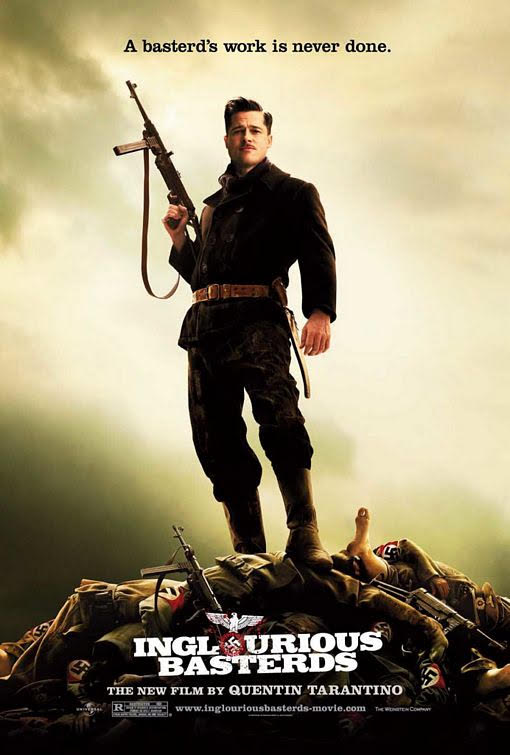Michael Cusumano here to take a break from batting around Once Upon a Time In... Hollywood to look back a decade.
 Scene - Chapter 2: Inglourious Basterds
Scene - Chapter 2: Inglourious Basterds
The Inglourious Basterds marketing team knew what aspects of the film to emphasize ten years ago.
“A basterd's work is never done” boasted the tag line next to the image of a triumphant Brad Pitt brandishing a machine gun atop a pile of dead Nazis. “An inglourious, uproarious thrill-ride of vengeance!” promised another line. The centerpiece of the trailer was Pitt’s Aldo the Apache jutting his chin into a tight close to declare “I want my scalps!”. The promise was clear. The director of Kill Bill is trading samurai swords for hand grenades.
Rewatching it now, ten years later, I can still feel the chasm between the film that was sold and the film that was delivered. Basterds is a sprawling, oddly-shaped, thesis paper of a movie. And while there is no shortage of violence, it takes a back seat to dialogue, mostly arriving in quick bursts to punctuate long scenes of conversation. At times, Basterds could be mistaken for an adaptation of a stage play, and a foreign language one to boot.
“Uproarious” though. The tag was telling the truth about that...

You didn’t necessarily realize right away just what you were in for. The justly celebrated opening scene is so riveting it’s hard to notice anything but the suspense and Waltz’s star-making villainy. It’s not until “Chapter 2: Inglourious Basterds” that you realize the film is going to be way more complex than advertised.
Following Pitt’s famous monologue, the sequence takes a hard swerve into a raving Hitler and the understanding sinks in that the Basterds’ exploits - the subject audiences could reasonably expect to make up the bulk of the film - was just skipped over. Save for a few brief snippets, the most material we get about the Basterds in action comes from Hitler’s frenzied summary. Tarantino, it turns out, is much more interested in the idea of the Basterds, than in documenting their exploits.

When the scene flashes back to the Basterds their latest ambush is already concluded. Instead of a shoot out, we get a tug of war between Hitler and the Bastards to control the narrative. Aldo’s monologue, it turns out, wasn’t a starting pistol to an action movie, but the opening salvo in a propaganda war that will wind its way through the film's interlocking chapters.
If this wasn’t already unexpected enough Quentin starts actively undercutting the heroes. The scene opens with them scalping the fallen Nazis, something that seemed a lot cooler as a figure of speech than in gruesome practice. “The Bear Jew” gets a hero’s entrance but when he gets down to the business of earning his infamy the beating he dispenses is nauseating. The music cuts out and there is only the sickening smacks of the bat. This has to be intentional because you know the maker of Kill Bill is capable of delivering the most masturbatory slo-mo Nazi death ever put on film. You can just picture Eli Roth swinging his bat like Redford in The Natural as he puts that Nazi’s lights out. Instead it’s disgusting. Far from reveling in the violence Quentin is more focused on the effect this beating has on the surviving Nazi. An effect so strong it spreads all the way back to Hitler who wildly commands that no one speak of the Bear Jew even though he is obviously consumed with the idea of the bat-swinging golem.

And while the heroes act like villains, Tarantino goes one step further and makes the Nazi Sergeant who suffers the beating (Richard Sammel, a fantastic one-scene performance), if not a sympathetic figure, then at least a recognizably human one. He is unexpectedly civil (I always expect to open with a defiant nazi salute, but he salutes Aldo respectfully) and there is honor in his willingness to give his life rather than reveal his fellow Germans’ position. Then this exchange happens when Donnie notices the German’s Medal:
Donnie: You get that for killin’ Jews?
Sgt. Rachtman: Bravery.
And he does indeed accept his fate with astonishing stoicism. One might be on the verge of grudging admiration until the German decides his last words should include an anti-Semitic slur and you’re reminded of the larger stakes at play, that for all their ugly tactics the Basterds have the noble cause and that for all his apparent courage, the recipient of the beating is still a Nazi. The ideas that we should recognize the humanity in our enemy and acknowledge the ugliness done in the name of the greater good, while still seeing the necessity in those actions is the stuff of a Terrence Malick movies, not Tarantino historical goofs, yet there those ideas are, underneath all the Tarantino jazz.
